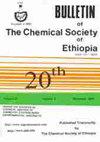Preparation of voltammetric sensors for taurine detection from Cu(II)-loaded carbon materials
IF 1.3
4区 化学
Q3 CHEMISTRY, MULTIDISCIPLINARY
引用次数: 0
Abstract
ABSTRACT. In this study, for the detection of taurine in philological fluids, modified electrodes were prepared from glassy carbon electrodes with MWCNT (multi-wall carbon nanotube) + Cu(NO3)2 + carbon-based material. A carbon-based material was obtained by carbonization of Pinus sylvestris branch needles (CPS). Cu(NO3)2 and MWCNT structure (Cu(NO3)2/MWCNT) were added to the carbon-based material and the obtained mixture was used in the modification of the glassy carbon electrode surface. The surface morphology and structure of the prepared electrodes were characterized by electron microscopy scanning (SEM) and atomic force microscopy (AFM). Taurine detection with a modified electrode was made by cyclic voltammetry (CV) in 0.1 M KCl (vs. Ag/AgCl). The calibration curve of the modified electrode for taurine in the 10-150 µM range showed a linear response, and R2 value was 0.976. Limit of detection (LOD) and limit of quantification (LOQ) of the modified electrode were found 19 µM and 9.75 µM, respectively. The application of the electrode as a chemical sensor was carried out with commercially available energy drink samples. Satisfactory results have been obtained from the samples. The sensor can be used for routine taurine analysis. This electrode can quickly determine the amount of taurine in real samples with 90% accuracy in two minutes. KEY WORDS: Taurine detection, Modified electrode, MWCNT, Sensor, Cyclic voltammetry Bull. Chem. Soc. Ethiop. 2023, 37(6), 1565-1576. DOI: https://dx.doi.org/10.4314/bcse.v37i6.20负载Cu(II)碳材料制备牛磺酸检测伏安传感器
摘要本研究以MWCNT(多壁碳纳米管)+ Cu(NO3)2 +碳基材料为电极,制备了修饰电极,用于检测语言流体中的牛磺酸。以松针为原料,进行炭化制备碳基材料。在碳基材料中加入Cu(NO3)2和MWCNT结构(Cu(NO3)2/MWCNT),并将所得混合物用于玻碳电极表面改性。利用电子显微镜(SEM)和原子力显微镜(AFM)对制备电极的表面形貌和结构进行了表征。采用0.1 M KCl (vs. Ag/AgCl)循环伏安法(CV)对改进电极进行牛磺酸检测。改良电极对牛磺酸在10 ~ 150µM范围内的校准曲线呈线性响应,R2值为0.976。修饰电极的检测限(LOD)和定量限(LOQ)分别为19µM和9.75µM。将该电极作为化学传感器应用于市售能量饮料样品中。样品得到了满意的结果。该传感器可用于常规牛磺酸分析。该电极可在两分钟内快速测定实际样品中牛磺酸的含量,准确度达90%。
关键词:牛磺酸检测,修饰电极,MWCNT,传感器,循环伏安法;公牛。化学。Soc。中国生物医学工程学报,2016,37(6):1565-1576。DOI: https://dx.doi.org/10.4314/bcse.v37i6.20
本文章由计算机程序翻译,如有差异,请以英文原文为准。
求助全文
约1分钟内获得全文
求助全文
来源期刊
CiteScore
2.20
自引率
8.30%
发文量
113
审稿时长
6-12 weeks
期刊介绍:
The Bulletin of the Chemical Society of Ethiopia (BCSE) is a triannual publication of the Chemical Society of Ethiopia. The BCSE is an open access and peer reviewed journal. The BCSE invites contributions in any field of basic and applied chemistry.

 求助内容:
求助内容: 应助结果提醒方式:
应助结果提醒方式:


